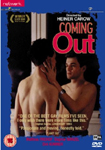

 |
Coming
Out
|
 |
|
Ladymol's Review Isn’t it frightening when “your era” becomes dated? This film was made in the 80s, and, boy, does it look dated! The clothes look like costumes from a Bananarama theme party. Of course, it’s set in grimy, industrial Germany and has that “everyone is always cold and hooked on vodka” look to it, which doesn’t help. A young high school teacher dates and eventually marries a female colleague to escape from the fact that he’s gay, something he clearly cannot come to terms with. A chance encounter with an old boyfriend sparks of all his repressed desires, and he tries to find his sexual identity by visiting gay bars. He meets a young man, his soulmate, and they have a passionate fling. However, events “out” him publicly, and he then has to decide which life he wants to live. The lead German actor is very attractive with an incredible body, and made the film very watchable. His lover looked like a pretty, young Mick Jagger, which was quite amusing. It has some quite arousing scenes between the two of them, but if you were to score the film for het v gay content, the het would get about 90% of screentime, which is disappointing. This is all about his conflict, rather than about his resolution of that inner turmoil. Then, of the 10% which is actually gay, about 9% of that is set in a bizarre gay bar, which is like nothing you’ve seen on Queer as Folk! It’s like a scene from Cabaret… decadence and dissolution of society, shown in the metaphor of cross-dressing. It’s “queer” taken to the extreme. Of course, the film was in German with subtitles, and I always get the feeling that we’re only being given a synopsis of the dialogue. If not, then it’s a very confusing film, because I have no idea what happened at the end. Worth watching for the pretty lead actor and great gay love scene. Cerisaye's Review The first and only gay movie to emerge from East Germany, this film looks at gay life in the dying days of Communist rule. So it’s worth watching as history. Another couple of very good reasons are gorgeous hunk Mattias Freihof as repressed schoolteacher Philip, and Dirk Kummer as Mathias, the dark-haired pretty boy who puts joy into his life. On Philip’s first day at work he bumps into a girl he knew at college. Tonja always fancied him, and they embark on an affair. Not something that sets the heather on fire. Philip pretends this is what he wants, conveyed through body language and glances. He shows more passion at the opera than with his girlfriend. An old neighbour of Tonja’s drops by. Apparently Jakob and Philip knew each other well in school. Seeing Jakob shakes Philip from acceptance of a life he hates. Confused and torn, he visits a gay bar where he’s welcomed by the colourful crowd. But he’s scared. We’ve seen violent homophobia, skinheads attacking a man on a train. Philip intervenes to chase the thugs away. That’s before troubling urges eat away at his resolve. When he witnesses another gay bashing, Philip runs away…just like he’s trying so manfully to do from his sexuality. In a queue for concert tickets he meets Mathias, a 19 year-old boy with his own problems, graphically revealed in the film’s shocking opening scene. Philip’s awakening sexual identity refuses to lie down. In a beautifully shot scene he discovers the joy of gay sex. Emotionally intense and very erotic, there’s more passion in this non-graphic sequence than all the soft core porn I’ve endured. So, with Tonja expecting marriage and troubled youth Mathias falling in love with him, Philip obviously is going to have to hurt one if he’s to have the other. It’s a messy situation with no easy answers. Freihof shows a man struggling to keep straight but overwhelmed by the power of all that repressed passion unleashed. It’s a classic theme of gay books & movies and the East German twist makes it interesting. We shouldn’t forget the role of the Stasi (secret police) in a shackled society where homosexuality was a sign of Western decadence. A gay bar owner tells Philip no names, no details. Everyone is afraid. A moving encounter with an elderly gent in a bar is one of the best things about this movie, teaching Philip that gay love can be deep and lasting, unbreakable as the strongest straight partnership. There’s no trite Hollywood ending. Philip emerges from his identity crisis with strength and courage, determined to pursue his chosen future, echoing the fall of the Berlin Wall that so appropriately marked the premier showing of this movie. Using genuine locations and real people gives the film a gritty, authentic feel. It’s laughably dated (think really bad 80s style and music). With fine performances, as a coming out story it has a lot to offer. Worth viewing. German with English subtitles.
|
Coming Out [1989] Available from Amazon UK here